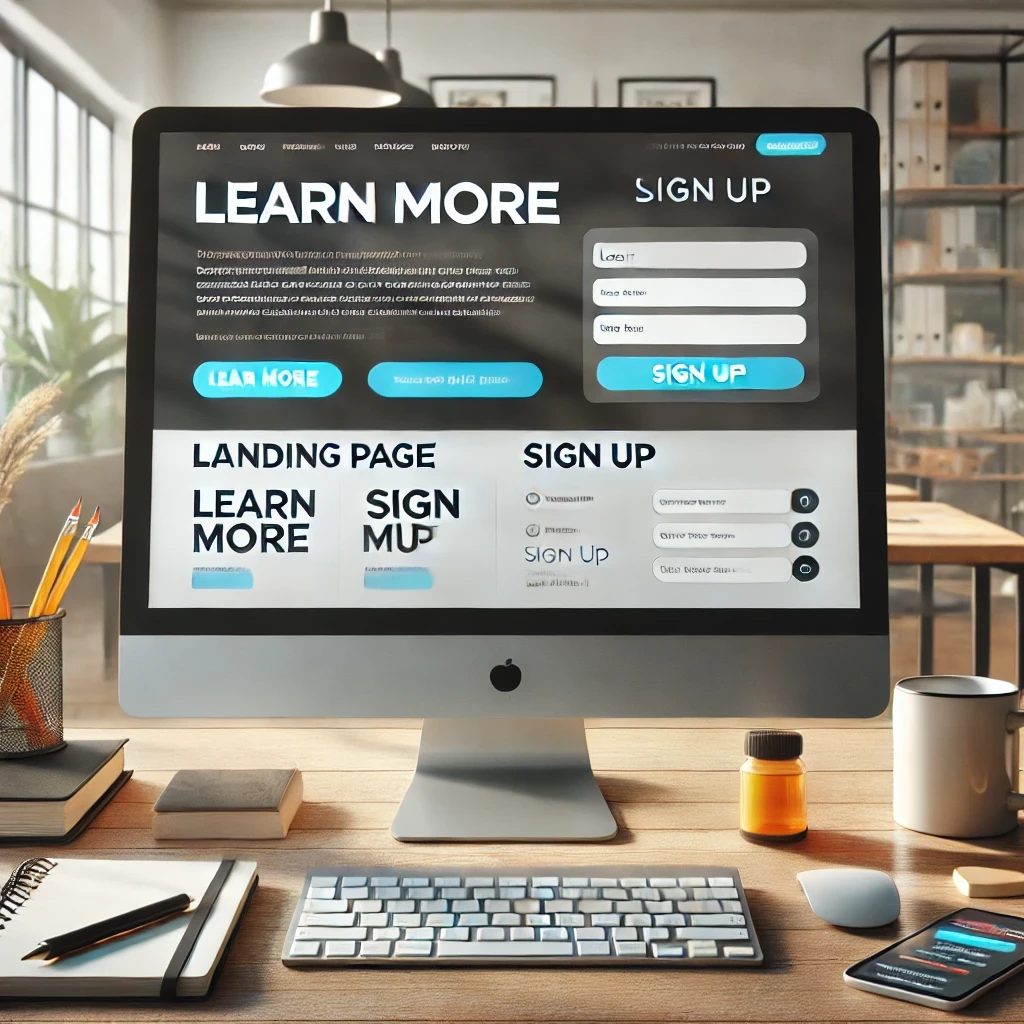PRODUCT
Design
Content
Publish
What is a landing page and how does it work
What is a landing page and how does it work
What is a landing page and how does it work
Website



In digital marketing, the concept of a "landing page" is widely known, but there are still many questions about what exactly defines a landing page and how it can be used effectively. This article aims to clarify what a landing page is, how it works, and why it is a crucial tool for increasing conversions on a website.
What is a Landing Page?
A landing page, also known as a destination page, is a web page designed with a main objective in mind: to convert visitors into leads or customers. Unlike other pages on a website, such as the homepage or product pages, the landing page is highly focused, with a single conversion goal, whether it be capturing contact information or selling a specific product.
Characteristics of a Landing Page
Focus on a Single Objective: The landing page is developed to accomplish a single action, such as filling out a form, making a purchase, or subscribing to an email list.
Simple and Direct Design: Simplicity is key. Elements like navigation menus, external links, or unnecessary information are minimized or eliminated to avoid distractions.
Clear Call to Action (CTA): The CTA is the most important part of the landing page. It should be clear, direct, and visible, guiding the user to take the desired action.
Content Focused on Conversion: All content, from the title to the body text and images, is optimized to lead the visitor to take the desired action.
How Does a Landing Page Work?
The functioning of a landing page is based on a simple and direct process: attracting the visitor and convincing them to take the desired action. Here is how a typical landing page works:
1. Attraction of the Visitor
The first step is to attract the visitor to the landing page. This can be done through various strategies, such as paid ads, email marketing campaigns, social media posts, or organic search results. The important thing is that the visitor is directed to the landing page with the expectation of finding something specific and valuable.
2. Presentation of the Offer
Once on the landing page, the visitor is immediately presented with the offer, whether it is a free e-book, a registration for a webinar, or an exclusive discount. The offer should be clear, relevant, and attractive enough to capture the visitor's interest.
3. Convincing and Conversion
After presenting the offer, the landing page must convince the visitor to take the desired action. This is done through a combination of persuasive text, attractive visual elements, and a convincing call to action (CTA). If the landing page is well designed, the conversion rate will be high, turning visitors into leads or customers.
4. Information Capture
If the conversion involves collecting data, such as name and email, a simple and direct form is presented. It is important that the form is easy to fill out and only requests essential information. Long or complex forms can discourage the visitor and reduce conversion rates.
The Importance of Landing Pages in Digital Marketing
In the context of digital marketing, landing pages play a crucial role. They are essential for the success of specific campaigns and for maximizing conversion rates. Let’s explore why landing pages are so important:
1. Increase in Conversion Rates
Landing pages are designed to convert. They eliminate distractions and focus the visitor on a single action, which tends to significantly increase conversion rates compared to other pages on the site.

2. Efficient Targeting
A landing page can be created to cater to a specific target audience, allowing for a personalization of the message and the offer. This increases the relevance of the page for the visitor and, consequently, the chances of conversion.
3. Improvement of Campaign ROI
Since landing pages are highly focused, they can improve the return on investment (ROI) of marketing campaigns, especially in paid advertising campaigns, where every click counts.
4. Facilitation of A/B Testing
Landing pages are ideal for conducting A/B testing, where different versions of the page are tested to see which performs better. This allows for continuous optimization of conversion rates.
Practical Examples of Landing Pages
To illustrate the concept, let’s consider some practical examples of landing pages:
Example 1: Free E-book
A software company offers a free e-book on "The Best Practices of Cybersecurity". The landing page is simple, with a strong title, a brief description of the e-book, and a registration form asking only for the visitor's name and email. The CTA is clear: "Download Now". This page is designed to capture leads interested in cybersecurity.
Example 2: Webinar Registration
A marketing agency hosts a webinar on "Digital Marketing Strategies for 2024". The landing page highlights the benefits of attending the webinar, presents the speakers, and includes a registration form. The CTA could be "Reserve Your Spot". The page is aimed at marketing professionals looking to update their skills.
Example 3: Exclusive Discount
An online store offers an exclusive 20% discount on selected products for new customers. The landing page showcases the discount, displays eligible products, and includes a "Shop Now" button that leads directly to the online store. This strategy aims to convert visitors into buyers.
Frequently Asked Questions about Landing Pages
1. What differentiates a landing page from a homepage?
A homepage serves as a general introduction to the site and contains links to various areas of the site. In contrast, a landing page is created with a single conversion goal, without distractions.
2. What are the essential elements of a landing page?
The essential elements include a strong title, a clear offer, a persuasive CTA, and a design focused on conversion.
3. How do I measure the success of a landing page?
The success of a landing page is generally measured by the conversion rate, which is the percentage of visitors who take the desired action.
4. How many landing pages should I have?
It depends on your business and your campaigns. Businesses that run multiple campaigns simultaneously may have several landing pages, each focused on a specific target audience or goal.
5. How can I improve the conversion rate of a landing page?
Improvements can be made through A/B testing, optimizing the design, making the CTA more visible, simplifying the conversion form, and ensuring that the offer is relevant to the target audience.
Conclusion
Landing pages are an indispensable tool in the arsenal of any digital marketing professional. When well designed, they can significantly increase conversions, improve campaign ROI, and provide a more focused experience for the user. By understanding what a landing page is and how it works, you can start using them more effectively in your digital marketing strategies.
Transform Your Business with an Amazing Website: Discover How the Dayo Agency Can Help Create the Perfect Online Presence for Your Company! Increase your visibility, attract more customers, and stand out from the competition with a customized and professional website. Don’t miss the opportunity to elevate your brand to the next level! Explore the services of the Dayo Agency and see how we can make a difference for your business.
In digital marketing, the concept of a "landing page" is widely known, but there are still many questions about what exactly defines a landing page and how it can be used effectively. This article aims to clarify what a landing page is, how it works, and why it is a crucial tool for increasing conversions on a website.
What is a Landing Page?
A landing page, also known as a destination page, is a web page designed with a main objective in mind: to convert visitors into leads or customers. Unlike other pages on a website, such as the homepage or product pages, the landing page is highly focused, with a single conversion goal, whether it be capturing contact information or selling a specific product.
Characteristics of a Landing Page
Focus on a Single Objective: The landing page is developed to accomplish a single action, such as filling out a form, making a purchase, or subscribing to an email list.
Simple and Direct Design: Simplicity is key. Elements like navigation menus, external links, or unnecessary information are minimized or eliminated to avoid distractions.
Clear Call to Action (CTA): The CTA is the most important part of the landing page. It should be clear, direct, and visible, guiding the user to take the desired action.
Content Focused on Conversion: All content, from the title to the body text and images, is optimized to lead the visitor to take the desired action.
How Does a Landing Page Work?
The functioning of a landing page is based on a simple and direct process: attracting the visitor and convincing them to take the desired action. Here is how a typical landing page works:
1. Attraction of the Visitor
The first step is to attract the visitor to the landing page. This can be done through various strategies, such as paid ads, email marketing campaigns, social media posts, or organic search results. The important thing is that the visitor is directed to the landing page with the expectation of finding something specific and valuable.
2. Presentation of the Offer
Once on the landing page, the visitor is immediately presented with the offer, whether it is a free e-book, a registration for a webinar, or an exclusive discount. The offer should be clear, relevant, and attractive enough to capture the visitor's interest.
3. Convincing and Conversion
After presenting the offer, the landing page must convince the visitor to take the desired action. This is done through a combination of persuasive text, attractive visual elements, and a convincing call to action (CTA). If the landing page is well designed, the conversion rate will be high, turning visitors into leads or customers.
4. Information Capture
If the conversion involves collecting data, such as name and email, a simple and direct form is presented. It is important that the form is easy to fill out and only requests essential information. Long or complex forms can discourage the visitor and reduce conversion rates.
The Importance of Landing Pages in Digital Marketing
In the context of digital marketing, landing pages play a crucial role. They are essential for the success of specific campaigns and for maximizing conversion rates. Let’s explore why landing pages are so important:
1. Increase in Conversion Rates
Landing pages are designed to convert. They eliminate distractions and focus the visitor on a single action, which tends to significantly increase conversion rates compared to other pages on the site.

2. Efficient Targeting
A landing page can be created to cater to a specific target audience, allowing for a personalization of the message and the offer. This increases the relevance of the page for the visitor and, consequently, the chances of conversion.
3. Improvement of Campaign ROI
Since landing pages are highly focused, they can improve the return on investment (ROI) of marketing campaigns, especially in paid advertising campaigns, where every click counts.
4. Facilitation of A/B Testing
Landing pages are ideal for conducting A/B testing, where different versions of the page are tested to see which performs better. This allows for continuous optimization of conversion rates.
Practical Examples of Landing Pages
To illustrate the concept, let’s consider some practical examples of landing pages:
Example 1: Free E-book
A software company offers a free e-book on "The Best Practices of Cybersecurity". The landing page is simple, with a strong title, a brief description of the e-book, and a registration form asking only for the visitor's name and email. The CTA is clear: "Download Now". This page is designed to capture leads interested in cybersecurity.
Example 2: Webinar Registration
A marketing agency hosts a webinar on "Digital Marketing Strategies for 2024". The landing page highlights the benefits of attending the webinar, presents the speakers, and includes a registration form. The CTA could be "Reserve Your Spot". The page is aimed at marketing professionals looking to update their skills.
Example 3: Exclusive Discount
An online store offers an exclusive 20% discount on selected products for new customers. The landing page showcases the discount, displays eligible products, and includes a "Shop Now" button that leads directly to the online store. This strategy aims to convert visitors into buyers.
Frequently Asked Questions about Landing Pages
1. What differentiates a landing page from a homepage?
A homepage serves as a general introduction to the site and contains links to various areas of the site. In contrast, a landing page is created with a single conversion goal, without distractions.
2. What are the essential elements of a landing page?
The essential elements include a strong title, a clear offer, a persuasive CTA, and a design focused on conversion.
3. How do I measure the success of a landing page?
The success of a landing page is generally measured by the conversion rate, which is the percentage of visitors who take the desired action.
4. How many landing pages should I have?
It depends on your business and your campaigns. Businesses that run multiple campaigns simultaneously may have several landing pages, each focused on a specific target audience or goal.
5. How can I improve the conversion rate of a landing page?
Improvements can be made through A/B testing, optimizing the design, making the CTA more visible, simplifying the conversion form, and ensuring that the offer is relevant to the target audience.
Conclusion
Landing pages are an indispensable tool in the arsenal of any digital marketing professional. When well designed, they can significantly increase conversions, improve campaign ROI, and provide a more focused experience for the user. By understanding what a landing page is and how it works, you can start using them more effectively in your digital marketing strategies.
Transform Your Business with an Amazing Website: Discover How the Dayo Agency Can Help Create the Perfect Online Presence for Your Company! Increase your visibility, attract more customers, and stand out from the competition with a customized and professional website. Don’t miss the opportunity to elevate your brand to the next level! Explore the services of the Dayo Agency and see how we can make a difference for your business.
You might also like
You might also like



Sales Page: Convert Visitors into Loyal Customers
Sales Page: Convert Visitors into Loyal Customers
Sales Page: Convert Visitors into Loyal Customers
Aug 25, 2024
Website
Otavio Luiz



Register your domain for free and get started today!
Register your domain for free and get started today!
Register your domain for free and get started today!
Aug 24, 2024
Website
Otávio Luiz



Practical Guide to Building Your Sales Website from Scratch
Practical Guide to Building Your Sales Website from Scratch
Practical Guide to Building Your Sales Website from Scratch
Aug 24, 2024
Website
Otávio Luiz



How to Create a Website: Complete Guide for Beginners
How to Create a Website: Complete Guide for Beginners
How to Create a Website: Complete Guide for Beginners
Aug 22, 2024
Website
Otávio Luiz
STAY UP TO DATE WITH THE LATEST NEWS. SUBSCRIBE TO OUR NEWSLETTER!

STAY UP TO DATE WITH THE LATEST NEWS. SUBSCRIBE TO OUR NEWSLETTER!

STAY UP TO DATE WITH THE LATEST NEWS. SUBSCRIBE TO OUR NEWSLETTER!
DAYO INTELLIGENCE AND PERFORMANCE
Avenida Paulista, 1106 Bela Vista
São Paulo - SP, 01310-914
Dayo Intelligence and Performance Ltd.
CNPJ: 57.516.832/0001-82
Copyright DaYo Intelligence and Performance 2024
DAYO INTELLIGENCE
AND PERFORMANCE
Avenida Paulista, 1106 Bela Vista
São Paulo - SP, 01310-914
Dayo Intelligence and Performance Ltd.
CNPJ: 57.516.832/0001-82
Copyright DaYo Intelligence and
Performance 2023
DAYO INTELLIGENCE AND PERFORMANCE
Avenida Paulista, 1106 Bela Vista
São Paulo - SP, 01310-914
Dayo Intelligence and Performance Ltd.
CNPJ: 57.516.832/0001-82
Copyright DaYo Intelligence and Performance 2024

